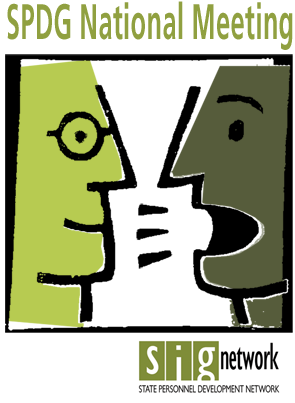
SPDG National Meeting
Creating Connections
October 14th and 15th, 2020



Session 1: Professional Learning State and District Planner
Slide presentation
Melinda George
Learning Forward
Join us in this breakout session to explore Learning Forward's new Professional Learning State and District
Planner. The planner was developed through a pilot of four SEAs and multiple districts in each state. We will
discuss the
implications for using the Toolkit for in person and virtual professional learning planning.
Session 2: Adding Teacher Voice in the Coaching Observation Process and Increasing
Data Collection Opportunities Through Teacher Reflection Protocols
Recording
Slide presentation
Paula Crawford; Laura Marsden; Carol Moffitt; Melanie Sharpe; & Marty Erskine
North Carolina SPDG
Faced with the conundrum of data collection in the time of Covid-19 shutdowns, the NC SIP team had to
ponder this problem of practice and identify a measure for data collection. This problem of practice became an
opportunity to develop a tool that ensures teacher voice in the observation process and meet the need of data
collection that informs coaching. The teacher is no longer a passive participant but rather, one that actively reflects on
their practice and student responsiveness to instruction.
| Handouts | |
| Reading Research Observation Tool | Reading Research Self-Reflection Tool |
| Foundations of Math Observation Tool | Foundations of Math Self-Reflection Tool |
Session 3: Meeting High-Quality Professional Development Indicators in Virtual Workshops
Recording
Slide presentation
Amy Gaumer Erickson; Cindy Medici; & Kimberlee Oakes
Florida
Join us to learn about the recently released HQPD Checklist-3 and how the SIM professional development
transitioned from multi-day face-to-face institutes to virtual workshops while maintaining adherence to adult
learning methods and creating numerous opportunities for meaningful engagement, practice with feedback, reflection on learning,
and planning for classroom application.
Session 4: Supporting Sustainability with District Capacity Coaching
Recording
Slide presentation
Janice Creneti; Sheila Ward
Florida
In order to sustain the initiatives implemented, Florida's SPDG works with each of its counties to
develop District Capacity Coaching (DCC). As SPDG gradually releases responsibility for technical assistance and
coaching to in-district personnel and district partners, DCC guides the development and execution of sustainability plans
and processes. Designated district personnel within DCC participate in professional learning to gain the skills and
knowledge to provide coaching and other supports. In this session, learn about the structure of DCC in Florida and
discuss the tools used to roll out the program in districts.
Session 5: Implementation Zones
Recording
Slide presentation
Ronda Jenson; Stephen Barr
Missouri
Informed by implementation science, the concept of implementation zones was developed as a data-driven
approach to describing district-wide implementation of the Missouri SPDG project (District Continuous
Improvement). Implementation zones provide a visual representation of implementation process and outcome data across the school
district. Based on the implementation zone, districts are matched with a coaching support team who is specializing on the
types of PD needed by districts in that zone. This has become a data-driven way for matching implementation needs with
targeted expertise, while maintaining consistency of the statewide system of support.
Session 6: A pandemic evaluation strategy: Asynchronous and virtual stakeholder focus groups
Recording
Slide presentation
Jason Torres Altman
Missouri SPDG
Participants in this session will leave with an idea about how to run asynchronous and virtual focus groups
with busy stakeholders, like educators or building administrators. Using an app like "Viber", evaluators and other
state personnel can moderate a dynamic discussion around key topics that you might have discussed while sitting
around a table in a pre-pandemic world, without having to balance participant calendars. Users can log-on, as available,
using their phones, do not need to set up a formal account, and can type, speak, take pictures, and send video.
Preparation for analysis is low-cost as most entries are already transcribed. Perhaps this is one technology-supported strategy to
launch this year as we look to collect data from educators that are busier, and harder to reach than usual.
Session 7: Peer Coaching
Recording
Slide presentation
Debbie Hartwig; Stephanie Van Dyke; & Chris Rauscher
Ohio Department of Education
A Peer Coaching handbook was designed for teachers in participating SPDG districts who do not have a
Literacy Coach. Peer coaching offers a supportive, collaborative framework for teachers to
bring professional learning to life in their classrooms.
Session 8: Leadership Team Reflection and Planning Tool
Recording
Slide presentation
George Tremblay; Michelle Lewis; & Christina MacDonald
New Hampshire SPDG
Purpose of the tool is to promote sustained impact of an innovation. Organized around 6 key processes and
designed to be completed by leadership teams at implementation sites and community collaboratives, the tool
presents optional discussion prompts followed by a few survey questions in each of the six sections. Annual administration
is facilitated by a process coach who regularly works with the team, and timed to immediately precede the new cycle
of action planning. Local use is to focus and inform action planning; State use is to monitor sustainability factors
and guide implementation support for the coming year.